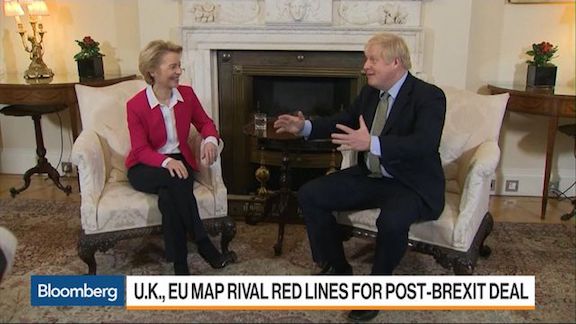Negotiations between the U.K. and the European Union are on course to end without a trade deal amid fears on both sides that their disagreements are too wide to bridge, officials familiar with the talks said.
Wednesday night’s dinner between Prime Minister Boris Johnson and Ursula von der Leyen, the European Commission president, left their teams believing it may be impossible to find a compromise before time runs out.

Negotiators are resuming their work on Thursday in Brussels, searching for a way to break the deadlock before Sunday, when the leaders are due to take a firm decision on whether to call time on the talks.
Failure to reach an agreement after nine months of negotiations would deliver a major blow to the British economy and disrupt supply chains for businesses in both the U.K. and the EU. Consumers would be hit by additional costs and disruption as tariffs and quotas are imposed on trade with the U.K.’s biggest and closest commercial partner.
The pound fell by more than 1% against the dollar to $1.3246. Options traders are bracing for turbulence around the Sunday deadline, with the spread between one-week and two-week implied volatility at the widest in a year.
So far, Brexit talks have been stuck on disagreements over the EU’s right to fish in British waters and the so-called level playing field rules for fair competition for business.
There is still no sign of how the differences over the fair competition issue can be bridged, an EU official said. Johnson argues that, for reasons of sovereignty, Britain must not be forced to follow the EU’s competition rules as they evolve in future years.
The EU says the U.K. must keep up with its changing regulations to protect the integrity of the bloc’s single market. Both sides have come to realize that it may be impossible to reach a compromise, the EU official said.
“I prefer no deal than a bad deal,” Luxembourg Prime Minister Xavier Bettel told reporters on the way to an EU summit in Brussels. “Already it’s bad for the EU that the U.K. left, but it’s even worse for the U.K., so we have to have a deal where we are all able to have the guarantees” needed and “find and a proper way to get out of this situation.”
Separately, the European Commission published its contingency plans in case no deal is signed. The bloc said these were only intended to ensure basic air and road connectivity between the EU and the U.K. and to allow for the possibility of reciprocal fishing access.
It is possible that the two sides could agree on a “friendly no-deal” and put in place reciprocal contingency measures, allowing trade talks to resume later in 2021, one EU official said.
U.K. Cabinet Office Minister Penny Mordaunt told the House of Commons that she is still hopeful an accord can be reached even though the two sides “remain far apart.”
“Even in these gloomy times, I am still optimistic a deal can be secured,” she said. “The only deal that is possible is one that is compatible with our sovereignty.”







